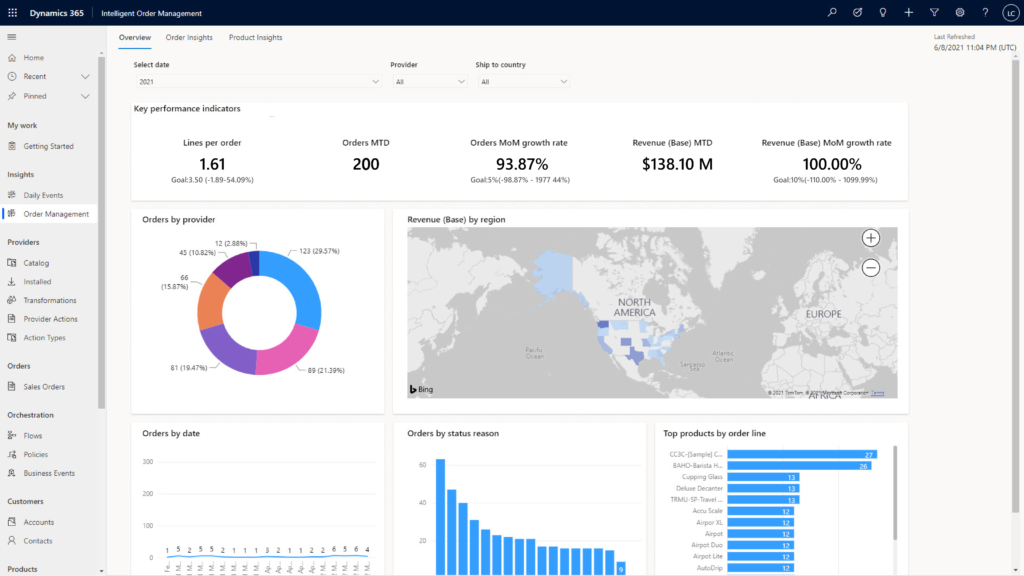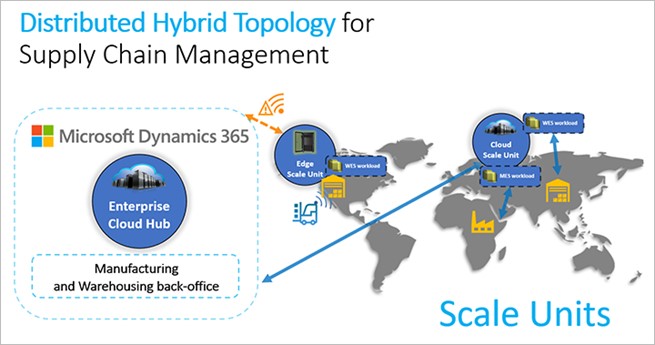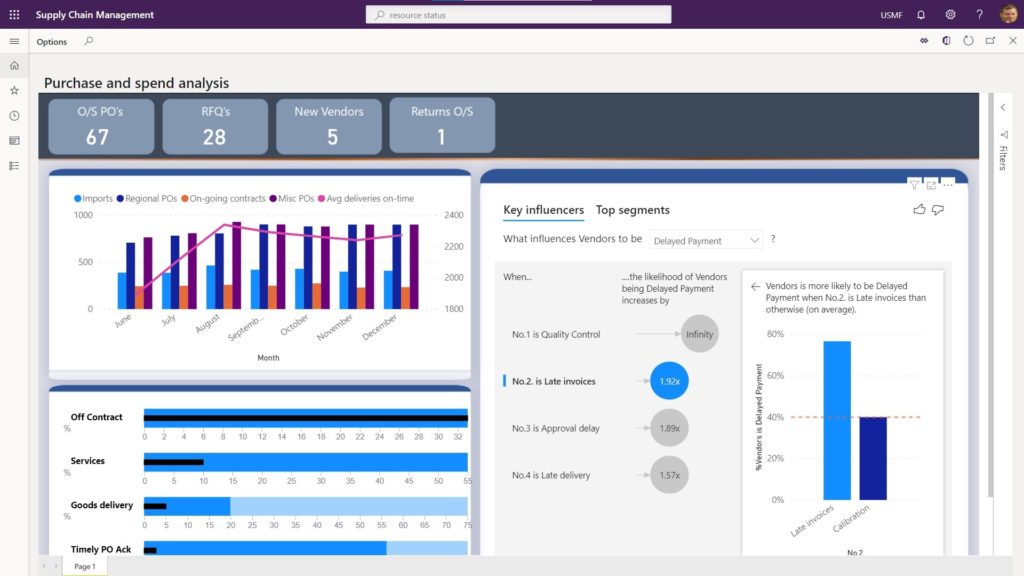In today’s fast-paced corporate environment, companies confront several obstacles such as round-the-clock discrepancy in supply and demand, secure data storage and streamlining, and time-to-value delivery difficulties along with the futuristic foothold of the business in the market.
Companies can resolve demand and supply imbalances by improving real-time visibility of the supply chain and inventories by running critical manufacturing and warehouse operations at high throughput on the cloud or the edge and that too with a sustainable and secure business future.
Unplanned equipment downtime can also be a challenge when ensuring business continuity in remote sites that are detached from the cloud. The good news is that it can be minimized by employing IoT and Mixed Reality to undertake preventive maintenance.
So, which supply chain management system is the most promising and available for long-term success, meeting rapidly changing client demands by conducting production and distribution planning in a matter of minutes?
This blog is all about the questions listed above, and it will break them down into comprehensive answers for your personal, gratified understanding by addressing your supply chain businesses.
Distribution and Logistical Management with Dynamics 365 Supply Chain Management
Key differences
The military coined the phrase logistics. Many historians consider Alexander the Great, who was born in 356 B.C., to be a logistics expert.
The contemporary supply chain management practice began in the twentieth century. Many experts believe that logistician Keith Oliver invented the phrase supply chain management in the early 1980s.
Logistics are supply chain management operations. Supply Chain Management encompasses a wide range of tasks, including production and inventory planning, labor planning, material and facility management, manufacturing, and service delivery.
Dynamics 365 Supply Chain Management focuses on optimizing processes to gain a competitive edge, whereas logistics focuses on satisfying customer demands and expectations.
Logistics is concerned with the efficient and cost-effective delivery of commodities to customers. Supply chain management oversees the transformation of raw materials into completed items as they migrate from supplier to production to warehouse to retailer and/or customer.
Intelligent Order Management with Dynamics 365 SCM
As e-Commerce gains momentum, businesses have the problem of increasing brand attachment while being profitable in order to satisfy customer expectations such as delivering goods as soon as possible and providing a frictionless returns experience.
To do this, Microsoft Dynamics 365 Supply Chain Management combines client data insights (including order lists) from Dynamics 365 Intelligent Order Management, allowing companies to optimize transportation and proactively overcome delays and disturbances en route in order to fulfill customer orders on time and on budget; real-time cost-effective.

Using smart technologies in conjunction with Dynamics 365, allows hybrid supply chain teams to communicate through chat, share screens for discussion, and submit issue updates on Teams. In addition to improved communication, users will be able to cooperate more efficiently by exchanging sales orders, return orders, and fulfilment order tracking data without leaving Dynamics 365 Intelligent Order Management. These skills contribute to the development of a hyper connected business that enables employees to cooperate as one business, everywhere—allowing people to thrive wherever and whatever they work.

Circular Economies and Reverse Supply Chains
Circular economies are one method that manufacturing companies are increasing their sustainability. Circular economy, also known as circularity, is based on reverse supply chain management, which addresses what occurs after a product’s useful life.
Without an agile and adaptable supply chain management solution, establishing these circular economy processes might be difficult. The Microsoft Circular Center program, which is part of our ambition to achieve zero-waste and carbon-negative operations by 2030, makes use of Dynamics 365 Supply Chain Management and Microsoft Power Platform to support the reuse and recycling of servers and hardware within our data centers. To date, the Circular Centers model has accomplished 83 percent reuse and 17 percent recycling of vital parts, while also helping to reduce pollution.
“We were looking for a warehouse management system that would allow us to model all the product flows that we needed while also connecting to datacenters and other systems used to manage our cloud assets. Dynamics 365 had all these functionalities to build exactly what we needed.”— Anand Narasimhan, General Manager of Cloud Supply Chain Sustainability, Microsoft.
This blog focuses on the fact that lets you accomplish this by encircling your current supply chain and ERP systems rather than replacing them. Let’s delve further into these topics.
Increase your Footprint using Dynamics 365.
Companies are beginning to utilize diverse types of technology to augment their efforts while dealing with complex supply chain procedures. According to studies, 94% of supply chain leaders feel that digital transformation would improve supply chain rudiments in the future years.
To reiterate, Dynamics 365 improves access to supply chain data and can communicate seamlessly between manufacturing, supply, sales, and distribution improve.
Furthermore, with Dynamics 365’s real-time data access, you can accurately observe variations in your financial graph and make proactive actions. Overall, distribution data, as well as their split by items and resources, can improve visibility for even operations.
To have an intrinsic idea about how Dynamics 365 Supply Chain Management can enhance your business’s operational visibility, this read by DST might help you.
The Dynamics 365 Supply Chain Management solution enables firms to expand up by utilizing analytics, IoT, and cloud computing technologies. Let’s look at some statistics to get a better sense of the future;
- Data analysis (41%), IoT (39%), cloud computing (39%), and information security (31%), are the technologies that are growing more important in the supply chain business. (GEODIS, 2017)
- 50% of businesses anticipate that technology developments will have a significant influence on supply chain, logistics, and transportation operations. (Forbes, 2018)
- Experts expect that global SCM software revenue would reach $8.5 billion by 2022. (Statista, 2020)
Maintain your Agility and Resilience with Digital Transformation
Microsoft Dynamics 365 Supply Chain solutions let businesses build a digital supply chain that links worldwide employees, suppliers, and logistics partners for end-to-end visibility and seamless communication.
There are a few key steps to kickstart your supply chain’s digital transformation for a resilient and sustainable future:
- Boosting supply chain visibility
- Strengthening collaboration skills for improved decision-making
- Designing sustainable operations
In addition to the new integrations for Dynamics 365 Intelligent Order Management, as well as the customer stories and new features discussed here, we are pleased to announce that Microsoft has been named a Leader in the Gartner Magic QuadrantTM for Cloud ERP for Product-Centric Enterprises for Microsoft Dynamics 365 in 2021.

Choose a Sustainable Future with Us
Dynamics Solution and Technology has made a reputation for itself globally, particularly in the Gulf and Mena areas, by providing business solutions under the pavilion of Microsoft Dynamics 365. Our qualified specialists use industry-specific solutions, like Dynamics 365 FinOps or Supply Chain Management, to improve many businesses and their operations.
Dynamics Solution and Technology has flexible and modular Supply Chain solutions that integrate disparate data sources in real-time, predict and solve disruptions, and create long-term competitive advantage.
One of the most compelling reasons to choose Dynamics Solution and Technology as your digital transformation partner is that We are a certified Microsoft Gold Partner, and our responsible business performance, with the quality-driven and unmatched value, delivered.
Contact us to learn more or to request a demo of the Dynamics 365 Supply Chain Management system.







